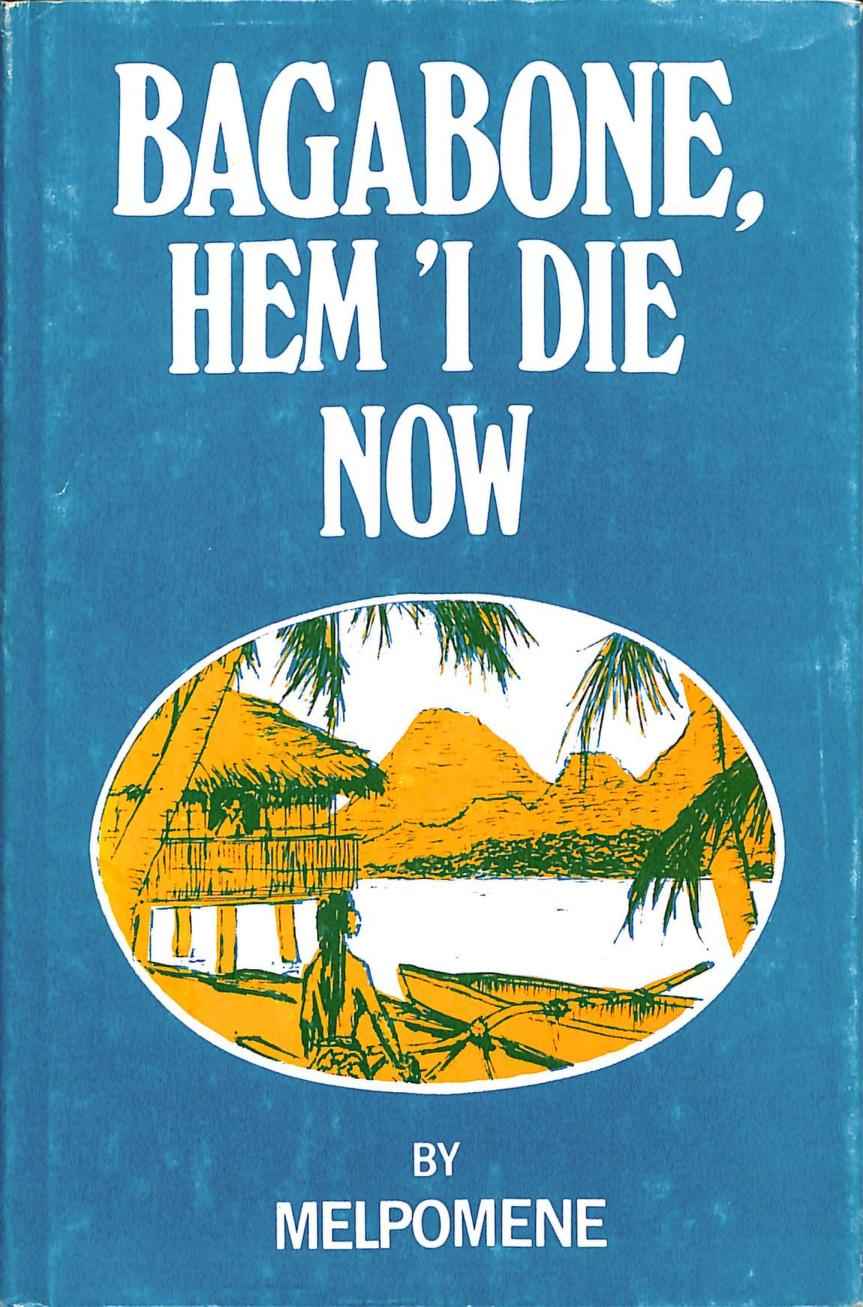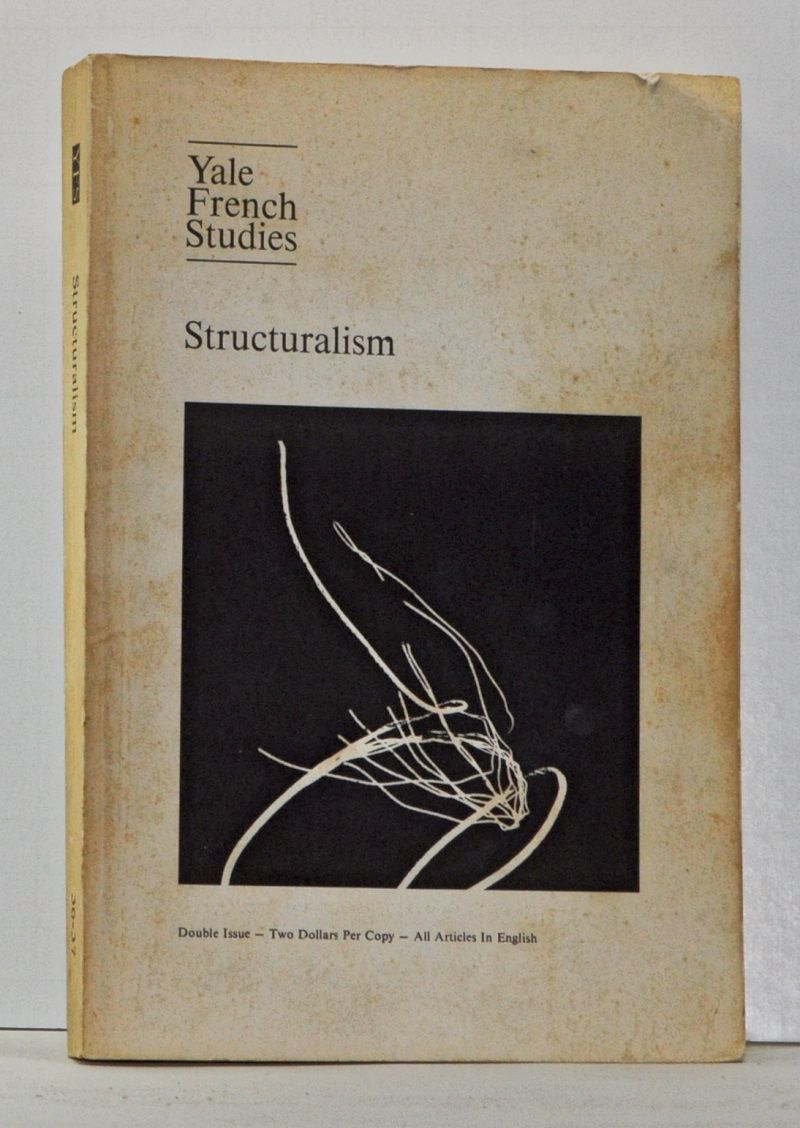Melpomene: Bagabone, Hem ‘I Die Now (1980)
Filed under fiction | Tags: · artificial intelligence, generativity, hoax, language, linguistics, literature, text

“Bagabone, Hem ‘I Die Now (1980) is perhaps the first novel that was purportedly written by a computer.
The back flap of the dust jacket states this about the book’s origins: “Can a computer write a novel? To find out, some experts in literature, linguistics, and computers at the Institute of Science and Technology, Jagiellonian University, Krakow, programed a computer, Melpomene, with English verb patterns and semantic (i.e., meaning) units drawn from twentieth-century women writers, as well as D.H. Lawrence, James Joyce, and some ‘angry young men’ of the 1960s. Then they added some patterns and units from Pidgin English and French, and the astounding result is Bagabone, Hem ‘I Die Now. Melpomene, which is the name of the Greek muse of tragedy, picked the title; translated from Pidgin English, it means, ‘Bagabone (a character in the novel) is dying.'”
Following its publication, Computer World published an article (“Publisher Claims Computer Composed Novel”, 25 Aug. 1980, p. 23) effectively defeating the publisher’s claim about the work’s computational origins. In the article, AI experts deem the novel to be human-written, and another source reports that there is no ‘Institute of Science and Technology’ at Jagiellonian University. Moreover, due to its mode of operation, the publisher (Vantage Press) would apparently have been paid to print the book. The copyright holder for Bagabone was a human—an Englishman named G.E. Hughes—who could not be reached by Computer World. (Intriguingly, this copy of the book is inscribed by one ‘Eric Hughes’, though this could be coincidental.)”
Publisher Vantage Press, New York, 1980
ISBN 0533042496, 9780533042494
136 pages
via James Ryan (xfoml)
Commentary: Peter Swirski (2013), James Ryan (2017), Joanna J Bryson (2018).
PDF (40 MB)
Internet Archive
Yale French Studies 36/37: Structuralism (1966)
Filed under journal | Tags: · anthropology, language, linguistics, literary criticism, literary theory, philosophy, psychoanalysis, structuralism, unconscious

An early English-language collection of French structuralist writings.
Essays by André Martinet, Philip E. Lewis, Claude Lévi-Strauss, Harold W. Scheffer, Sheldon Nodelman, Jan Miel, Jacques Lacan, Geoffrey Hartman, Jacques Ehrmann, Michael Riffaterre, and Victoria L. Rippere. Bibliographies compiled by Elizabeth Barber, Allen R. Maxwell, Jacques Lacan, Anthony G. Wilden, and T. Todorov.
Edited by Jacques Ehrmann
Publisher Yale University Press, 1966
272 pages
PDF (17 MB)
Comment (1)Roman Jakobson: My Futurist Years (1992/1997)
Filed under book | Tags: · 1910s, 1920s, biography, dada, formalism, futurism, language, linguistics, literary theory, literature, poetics, poetry, slavic studies

“Born in Moscow in 1896, Roman Jakobson was a founder of and a key figure in two influential schools of 20th century literary thought: Russian formalism, and later, during his years in Prague, structuralism. Forced to flee the invading Nazis, Jakobson spent time in Denmark, Norway, and Sweden, before coming to the United States in 1941. During his long and illustrious academic career in the U.S., Jakobson was a professor of literature and linguistics at Columbia, Harvard and MIT. Up to his death in 1982, he published 500 monographs and articles on linguistics, Slavic studies, poetics, and semiotics.
Vital as the extraordinary innovative and turbulent period that spawned these writings, My Futurist Years is one of the most important reflections on the Russian Futurist movement and a cornerstone in the career of one of the century’s greatest linguistic and literary thinkers.
Jakobson’s rare sensibility in his explorations in language and art are no more evident than in this volume, detailing the formative moment in his public and personal life. Along with the quite moving recollections of his friendships with such Modernist figures as Mayakovsky, Khlebnikov, and Malevich, the book includes Jakobson’s letters to other Futurists active in the scene and to his close friend Elsa Brik, later to gain notoriety as the French writer Elsa Triolet and wife of the poet Louis Aragon.” (from the back cover)
First published in Russian as Jakobson-budetljanin: sbornik materialov, Almqvist & Wiksell International, Stockholm, 1992.
Compiled and Edited by Bengt Jangfeldt
Translated and with an Introduction by Stephen Rudy
Publisher Marsilio, New York, 1997
ISBN 0941419797
371 pages
in the Unlimited Edition
Review: Avril Pyman (Slavonic & East European Review, 1993).
PDF (21 MB, updated on 2019-9-27)
Comment (0)
